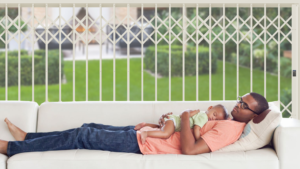We all love our children and their need to explore; however, this sometimes puts them in danger. As parents, we cannot always watch our children and keep them safe and free from harm. It is imperative to teach them about personal security and how to keep safe when parents or another trusted adult is around. Here are some basic safety rules you can teach your little ones.
Where to locate the emergency contact list
Children need to be able to use the telephone and know how to ask for help. Teaching them contact information can be useful because they should know how to react in an emergency.
Your children should know your contact details or where to get the details. They should know their names, addresses and who to contact. If your children are too young to memorize all this information, you should teach them where to locate this information. The best contact information they should know are of their parents, local police station, fire department, family doctors and a trusted family friend.
For younger children who might not be able to identify a dangerous situation, role playing is necessary. This will improve their knowledge of identifying and reacting to a dangerous home situation.
Never open doors for strangers
This is probably one of the most important things to teach children. When children are young they get excited when the door rings. They might even open doors before parents do without knowing who is on the other side. The best rule of safety for everyone would be to teach younger children never to open the door.
Older children should be taught to ask the person on the other side to identify themselves before opening for them. Another way to help them with identification is by installing spy wireless cameras so that they can see who the person is.
Stay clear from the medicine cabinet
Children should stay away from the medicine cabinet. The cabinet should always be locked so that they cannot easily gain access. Medication that is intended for children can be dangerous, especially if ingested in large quantities.
Parents should teach their children not to take any medication that they haven’t been given to by either them or another trusted adult. Older children who can take their own medication should be supervised so that they take the recommended dosages.
How to practice water safety
Children under the ages of 6 should be supervised when taking a bath or playing in a pool because they could easily drown. Children have thinner skin than adults – making them prone to burning; and it is because of this factor that you should teach them to test the temperature of their bath water before getting in.
Another safety rule kids should know is that they should never touch any electrical appliances with wet hands, as this could lead to electrocution.
When children are young, they should know basic swimming skills such as floating so that they don’t panic when they’re in the pool. They should also use protective swimming gear such as floating armbands.
Know how to use the home security system
If your home has a security system then you need to teach your kids how to use it. They need to know how to use it when entering the home after school or to deactivate a false alarm. Teach them how to activate it, where the panic buttons are located and how to activate them.
Children should be taught to keep the information about the security system confidential so that they don’t share the information with people who are not family.
Be aware of food allergies
Parents with children with allergies should speak to them about what they’re allergic to and why the food is unsafe for them to consume. They must understand the difference between “safe” and “unsafe” foods and how consuming unsafe foods could affect their wellbeing.
An easy way to teach your child about their allergies is involving them in grocery shopping where you will show them food that is safe for them to consume. Encourage them to share their food allergies with others so that they get used to them.
Not to keep unsafe secrets
Parents should encourage their children to be open with them and not keep secrets. Criminals and pedophiles usually encourage children not to tell adults when they do anything to harm them.
Teach them the difference between safe and unsafe secrets. Parents should also listen to their children when they say they are uncomfortable around certain people. They should trust their children so that they can be more forthcoming with information.
Conclusion
We might not be able to keep track of our children 24/7, but their safety should always be prioritized. With these tips you can prepare them for emergency situations so that they can be safe.
For protection at school, here are 5 Reasons Schools Should Consider Building On-Campus Safe Rooms.



